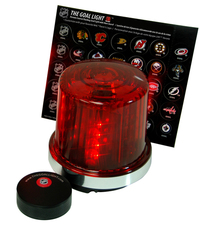I am currently working on a project to incorporate the Spark core with a Goal Light(pictured below). With some help obtained from these forums I already have the light functioning with the Spark Core. My next step is to have the Spark core trigger light when my favorite team(Boston Bruins) scores a goal.
Initially I found this. Someone had done something similar with Arduino and was nice enough to put it on github. I believe that this version is a little more complicated than it needs to be for my application.
That version does use JSON from this page: Live Scores
Jesse Scott, author of the above example had very useful code in his “parseTeam.pde” to accomplish what I need. I just need some help from the community to complete the code.
I plan to post pictures and a wiring diagram upon completion of the project, when I put everything together.
Thanks to @kennethlimcp for helping with some initial brainstorming.



